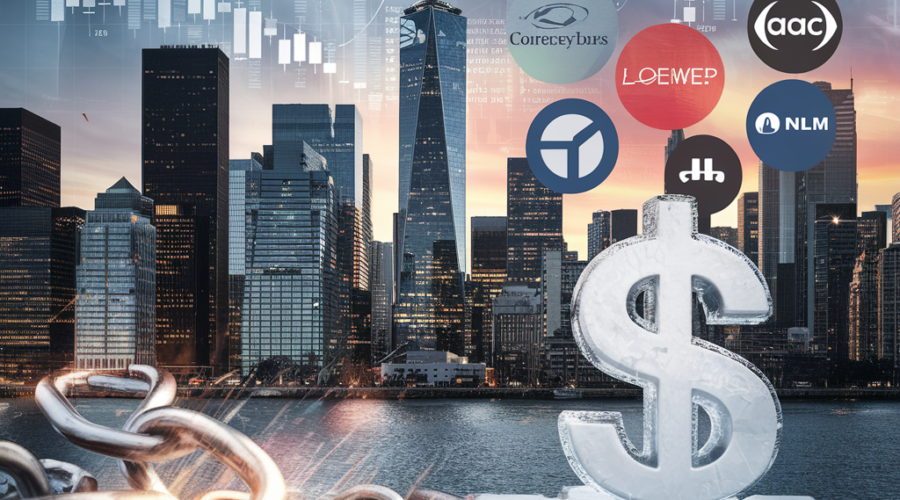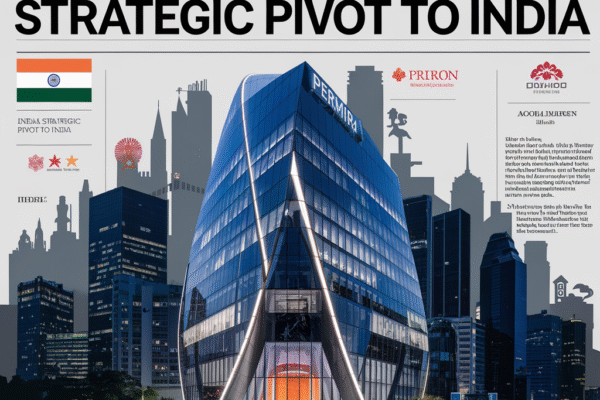The Trump administration’s latest tariff offensive has triggered a seismic shock across global capital markets, with at least $150 billion in pending mergers and initial public offerings being shelved or canceled outright since April 2[1][3][5]. This abrupt freeze in corporate dealmaking comes as the S&P 500 suffers its worst weekly decline since March 2020, plummeting 9.2% amid fears of a full-scale US-China trade war[5][10]. Investment banks now estimate the combined impact of canceled transactions and reduced equity valuations could erase $2.3 trillion from global market capitalization by year-end[3][9].
Tariff Escalation Triggers Market Meltdown
President Trump’s April 2 executive order imposing 10-50% tariffs on $300 billion of Chinese imports marked the largest single-day protectionist measure since the Smoot-Hawley Act of 1930[12][13]. Within 72 hours, China retaliated with targeted export controls on rare earth minerals and 25% tariffs on $60 billion of US agricultural exports[13][14]. This rapid escalation pushed JPMorgan’s recession probability model to 60% for Q4 2025, up from 40% pre-announcement[3][5].
IPO Pipeline Grinds to Halt
The equity market rout has decimated 2025’s much-anticipated IPO revival. Swedish fintech unicorn Klarna abruptly paused its $15 billion NYSE listing despite completing SEC filings, marking the third delay for Europe’s largest potential fintech debut[6][9]. US ticket resale platform StubHub postponed its investor roadshow indefinitely, while Israeli trading platform eToro pushed back its $3.4 billion offering until late April at the earliest[5][7][9].
Bankers report 17 US IPOs have been withdrawn since April 3, compared to just 5 postponements in all of Q1 2025[3][6]. The ICE NYSE IPO Index shows new listings underperforming the S&P 500 by 14% year-to-date, reversing 2024’s 22% outperformance[2][9]. “We’re seeing 2008-level risk aversion,” said Goldman Sachs’ Philipp Suess. “The window for mega-IPOs has slammed shut until at least Q3″[3][5].
Private Equity Retreats From Cross-Border Deals
Leveraged buyout activity has contracted 38% quarter-to-date according to PitchBook data, with London-based Permira abandoning its €4.2 billion bid for German software firm TeamViewer on April 3[3][5]. US private equity firms have recalled 23 deal teams from Asia-Pacific assignments since the tariff announcement, refocusing on domestic middle-market transactions below $500 million[1][5].
“It’s not the tariffs themselves but the regulatory uncertainty that’s paralyzing decision-making,” said Eversheds Sutherland’s Antony Walsh. “We’re advising clients to assume 18-24 months of trade policy volatility regardless of November’s election outcome.”[5]
Sector-Specific Impacts
Technology: Supply Chain Chaos
The semiconductor sector has been particularly hard hit, with NVIDIA shares plunging 14% in two days after China restricted gallium exports critical for chip production[10][13]. Apple suppliers report 43% of US-bound components now face tariff barriers, potentially adding $45 to iPhone 16 production costs[10][13].
Financial Services: BNPL Collapse
Buy-now-pay-later providers have seen $28 billion in market value erased since April 2, with Affirm Holdings down 44% year-to-date[6][9]. This sector’s meltdown reflects dual pressures of rising consumer credit risk and disrupted Asian manufacturing partnerships[6][10].
Industrial: Aerospace Standoff
Boeing’s proposed $4.7 billion acquisition of Brazilian aerospace firm Embraer has been put on ice following China’s threat to block Airbus deliveries in retaliation[5][13]. The impasse leaves both manufacturers unable to complete critical narrow-body jet production chains[13].
Geographic Divergence Emerges
While US and European deal volume cratered 19% and 31% respectively in Q1, Asia-Pacific M&A surged 87% to $584 billion driven by Chinese state-backed consolidation[1][3]. This regional bifurcation suggests multinationals are accelerating “friendshoring” strategies, with Tencent completing three $1B+ acquisitions in Southeast Asia last week alone[3][13].
Structural Market Shifts
The Treasury Department reports corporate cash reserves hit $2.1 trillion in March as companies hoard liquidity, while leveraged loan issuance has dried up completely[3][5]. This cash preservation mentality contrasts sharply with 2024’s $1.4 trillion in stock buybacks, signaling a fundamental rethinking of capital allocation priorities[2][6].
Path Forward: Survival Strategies
Leading consultancies recommend four crisis management steps: 1) Stress-testing supply chains for 100% tariff scenarios 2) Accelerating automation investments to offset labor cost inflation 3) Pivoting M&A strategies to domestic vertical integration 4) Establishing war chests for distressed asset acquisitions[3][5][13].
As Goldman Sachs’ Suess concluded: “The era of globalization-by-default is over. Every corporate strategy now needs built-in geopolitical shock absorbers.”[3][5]
Sources
https://www.pymnts.com/acquisitions/2025/president-donald-trump-tariff-tactics-yield-tepid-dealmaking-activity/, https://ir.theice.com/press/news-details/2024/The-New-York-Stock-Exchange-Leads-Industry-in-Global-IPO-Proceeds-for-the-First-Half-of-2024/default.aspx, https://www.vietnam.vn/en/hoat-dong-m-a-ipo-giam-manh-vi-noi-lo-suy-thoai-va-thuong-chien, https://www.sec.gov/Archives/edgar/data/1722608/000119312518101601/d487167d424b4.htm, https://www.globalbankingandfinance.com/USA-TRUMP-TARRIFS-DEALS-bba59527-48b9-436f-a90b-5d430b573ce1, https://www.pymnts.com/markets/2025/klarna-puts-public-listing-on-ice-and-signals-a-chill-ahead-for-fintech-ipos/, https://wmbdradio.com/2025/04/04/tariff-turmoil-puts-a-freeze-on-global-ma-dealmaking/, https://kfgo.com/2025/04/04/tariff-turmoil-puts-a-freeze-on-global-ma-dealmaking/, https://www.tradingview.com/news/invezz:efb0b2dd5094b:0-klarna-and-stubhub-delay-ipo-plans-as-trump-tariff-shock-rattles-investor-sentiment-report/, https://coincentral.com/nvidia-nvda-stock-analysis-shares-plummet-7-as-us-china-trade-tensions-reach-boiling-point/, https://cointelegraph.com/news/stablecoin-circle-may-pause-ipo-plans, https://en.wikipedia.org/wiki/China%E2%80%93United_States_trade_war, https://www.moneycontrol.com/world/trade-war-2-0-ca-breaks-down-china-s-biggest-retaliation-yet-to-us-tariffs-and-who-takes-the-hit-article-12985938.html, https://taxfoundation.org/research/all/federal/trump-tariffs-trade-war/





